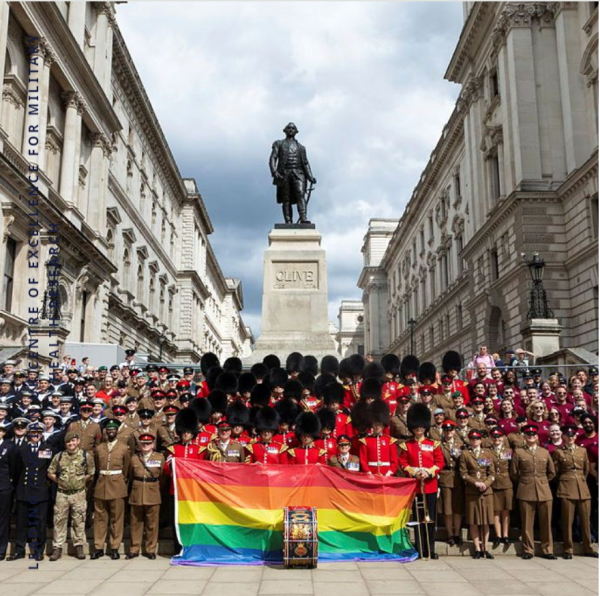
Background on the study
Up until the year 2000, lesbian, gay, bisexual, and transgender (LGBT+) individuals were banned from serving openly in the United Kingdom (UK) Armed Forces. Recent developments, such as government inquiries to address issues of historical hurt among the LGBT+ veteran community during the ban, focus on a community who has been unheard in legal avenues and are starting to be included in research to date.
While such efforts are much needed, they may exclude the experiences of those who are currently serving, or have served, in the post-ban era. Within the United States (US) military, research indicates that LGBT+ ex-serving personnel are more likely to experience mental health concerns, including posttraumatic stress disorder (PTSD), depression, alcohol misuse, and suicidal ideation and attempts, compared to their cisgender (i.e. a person whose gender identity matches the sex they were assigned at birth), heterosexual counterparts.
A qualitative analysis of transgender veterans in the US indicated that there were unique challenges and strengths experienced by this population that are vastly under-researched at this time. As such, there is a need to understand the health and wellbeing of the LGBT+ population amid increasing diversity among the UK Armed Forces.
What do we already know?
In the general population, LGBT+ individuals hold higher risks of physical and mental ill health than their heterosexual and cisgendered counterparts. A recent review of thirty papers looking at the health and wellbeing of serving and ex-serving LGBT+ personnel found no UK studies on this population. Another study focusing on US LGBT+ serving and ex-serving personnel found that LGBT+ serving personnel were more likely to leave the military upon completion of their service commitment compared to non-LGBT+ personnel (33% of transgender serving personnel and 20% of cisgender lesbian, gay, or bisexual serving personnel compared to 13% of non-LGBT+ personnel) indicating that the lifting of bans has not been fully adequate in making LGBT+ serving personnel feel accepted within the military.
What will Sarah’s PhD focus on?
Over the next three years, this PhD study aims to provide an overview of the health and wellbeing among UK LGBT+ serving and ex-serving Armed Forces members, including exploring the prevalence of, and identifying the risk and protective factors associated with, various health and wellbeing outcomes. The PhD study will apply both qualitative and quantitative methods (in-depth interviews and statistical analyses), and participants will include UK military service personnel and ex-service personnel who have participated in the King’s Centre for Military Health Research (KCMHR) Health and Wellbeing Cohort Study.
Why is it important?
This project is the first of its kind in the UK, and will provide novel data on the health and wellbeing of UK LGBT+ serving and ex-serving personnel post-ban. Identifying the risk and protective factors associated with health and wellbeing outcomes (such as PTSD, depression, and substance abuse) among LGBT+ service personnel and veterans and understanding the experiences of minorities within the UK military will help to provide robust evidence to government and wider stakeholders following calls for increased diversity.
As well as providing peer-reviewed evidence of LGBT+ health and wellbeing among serving and ex-serving UK military personnel in the post-ban era, it is important to explore what the recent experiences of LGBT+ Armed Forces might be in terms of military cultures, their sense of belonging and inclusion, and whether healthcare services understand their needs. There is also a need for cross-cultural research, namely, comparing outcomes and risk and protective factors for health and wellbeing with other nations’ outcomes.
This research has potential clinical, occupational and lifestyle implications and could be a part of improving military and veteran mental health services in the UK. It will inform the development and implementation of effective prevention and intervention methods to protect the mental health and wellbeing of the UK LGBT+ Armed Forces as well as those who have left Service.
Who is conducting the research?
This PhD project, conducted in partnership with the Royal British Legion, is being carried out by Sarah Rabin, and supervised by Dr. Rachael Gribble, Dr. Marie-Louise Sharp, and Dr. Howard Burdett. It is funded by the London Interdisciplinary Social Science Doctoral Training Partnership within the Economic and Social Research Council (ESRC). KCMHR is a fully independent research group.
Sarah has always had an interest in military populations. She completed an undergraduate degree in psychology in her native California, and then worked at the US Department of Veterans Affairs, where she researched Alzheimer’s and dementia, self-harm and suicide, and genome mapping, before moving to London. She completed her Master’s in War and Psychiatry at King’s College London, where her dissertation focused on the final withdrawal of troops from Afghanistan and its psychological impacts on UK Armed Forces personnel and veterans. Sarah worked as a Research Assistant within KCMHR prior to starting this PhD. Her research interests include marginalised populations within the military, suicidality, and military mental health more broadly.
Want to know more?
For updates on this study and other work being conducted at KCMHR on @kcmhr on X (formerly Twitter) and take a look at the most recent blog posts

















